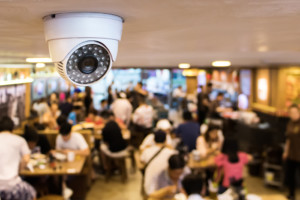Privacy matters quite a bit to a large number of people. Some 150 countries had codified a right to privacy in their constitutions. And nowhere has the debate over what constitutes a right to privacy raged as fiercely as in the United States. As government surveillance capabilities have increased, private businesses that want to keep their facilities secure have started asking themselves a question: Is surveillance with security cameras legal?
Are Home and Business Security Cameras Legal?
 Just because a product gets sold on the open market doesn’t make it legal, and with all the headlines surrounding security that have appeared in the news, business and multi-unit-apartment owners have reason to wonder about such devices. Unfortunately, in the United States, you won’t find any federal laws about privacy protections.
Just because a product gets sold on the open market doesn’t make it legal, and with all the headlines surrounding security that have appeared in the news, business and multi-unit-apartment owners have reason to wonder about such devices. Unfortunately, in the United States, you won’t find any federal laws about privacy protections.
That leaves it up to the states — and different states have different positions on what constitutes adequate privacy protects. For instance, according to Nolo, California restricts the installation of one-way surveillance mirrors. Meanwhile, Connecticut won’t let employers “operate surveillance equipment in areas designed for employee rest or comfort — such as restrooms, locker rooms, or employee lounges.” Meanwhile, UpCounsel states that Florida “passed a law that ties criminal penalties to hidden videotaping of individuals anywhere they have a reasonable expectation of privacy, such as their bathroom.”
What does that mean for operators of commercial business and large-multifamily housing units? Though stipulations may vary from locale to locale, there are a few hard-and-fast rules you should apply:
- Place cameras in public areas
- Do not hide cameras unless absolutely necessary
- Do not mount cameras with microphones (not every state allows for recording audio from third parties without their express consent)
Do You Need a Sign For Surveillance Cameras?
If you follow the guidelines above, you generally will not need to post signs indicating the presence of security cameras in most states. However, sometimes businesses need to place cameras in private areas to deter losses. (Think of surveillance around store changing rooms to prevent theft.) What then?
In those cases, the most prudent course of action would involve openly posting a sign so that others know about the presence of cameras. Additionally, it doesn’t necessarily hurt to put signs in public areas, even if cameras aren’t hidden and don’t contain microphones. Such steps help minimize liability. But the wisest course of action has to be consulting with outside legal counsel in your state prior to any security installation.
Security vs. Spying
You can see the contrast between security and spying by looking at the definition of the word “surveillance.” Oxford Dictionaries defines it as “close observation, especially of a suspected spy or criminal.” So observing a particular public area would certainly qualify as security. But capturing footage of locations where individuals can reasonably expect to have privacy or somehow monitoring people off of the premises where you do business? That could easily put you into trouble.
If you need a security system but aren’t sure about the legalities of its installation and operation, contact AT&I. Not only do we service three South Florida counties, we’ve worked in the security industry for more than two-and-a-half decades. We understand how to correctly guide our clients and protect their places of business. Reach out to us via phone (866-436-3516) or on our contact page.


















